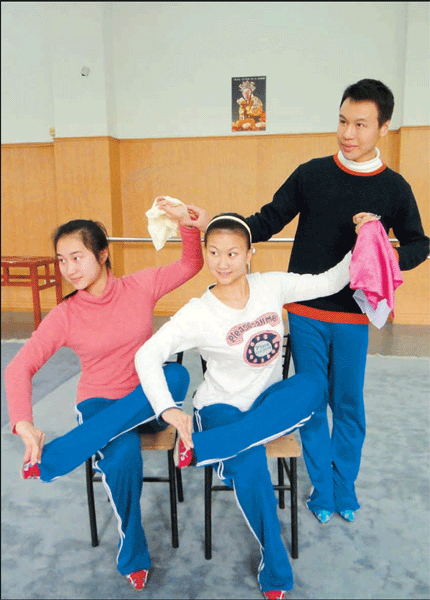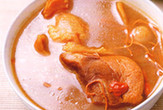
Nandan artist Mou Yundi instructs students Xiong Chenyu (left) and Zeng Qiuling in how to assume positions wearing tiny shoes for "bound feet."
There's a long tradition of men playing women in Peking Opera and nandan performance was an acclaimed art form, but changing attitudes and women on stage mean most nandan players are artifacts, guys out of work.
For hundreds of years, when it was unthinkable that a woman would appear on stage, all the female roles in Peking Opera and other traditional Chinese operas were played by men who specialized in particular types of women, down to the most minute gesture, the flick of a finger, the lifting of a hem.
In fact, there were mainly five traditional female (dan) roles played by men (generally called nandan). There were old women (laodan), martial women (wudan), young female warriors (daomadan), virtuous noble women (qingyi) and spirited unmarried women (huadan). All played by men.
They learned to move their hands in such a way as to minimize the size of their hands so they would appear smaller, like women's hands. They walked on uncomfortable high-heeled shoes to imitate the swaying, mincing steps of a woman with bound feet. In short, they played the idealized woman, the beautiful, graceful concubine or noblewoman depicted in poetry, paintings and literature.
Fading art
Today, not only are highly stylized Peking Opera and other traditional operas fading, but all those female roles are being taken by actresses, who sing, speak, act and perform acrobatics, and, of course, portray charming women.
Are women better at portraying women in the classics, or do men (who wrote all the classic operas) devoting their lives to nandan bring something special to the role, something women cannot tap? That's an open question.
Certainly, some say that men may have an edge when it comes to stamina and stunts; some like the male falsetto. Many women tend to become stout in middle age, making portrayal of supple creatures difficult and shortening their careers.
No boys or young men are studying for nandan roles in the Shanghai Theater Academy or at the Peking Opera School in Beijing.
Only a half-dozen nandan artists around the country are still active on the Peking Opera stage. Few families today would allow a young boy and only child to undertake many years of arduous training for a low-paying stage career - and worse, playing a woman. Today, that choice raises eyebrows about masculinity and sexual orientation. As a result, opera trainees for any role tend to come from relatively poor families or families with a long operatic tradition. And when a handsome boy's voice breaks in puberty - and if he cannot control it and restore a high pitch, or falsetto - he may well be out of a job.





Why not rent a boyfriend, or girlfriend to please parents during the Spring Festival?